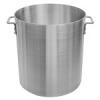Hi,
I am helping one popcorn company to getting them ready for SQF version 9 level 2 audit.
Their current sanitation program of the popper is to using wipe to remove debris, then fill up the popper with municipal water, boil it up to 100'C, let is boil for 5-10 minutes, and drain the hot water off to clean the inner part of the popper and the inner lid.
The client says the popper manufacturer doesn't recommend them to use any of the detergent and sanitizer considering chemical left-over.
Understanding that during the pasteurization process, all pathogen, virus, and parasite will got killed, theoretically. I am thinking to ask them to do a validation of their cleaning process, testing minimum E.coli, Salmonella, Staphylococcus, Listeria, HPC.
But then when it comes to the outside of the popper and the top lid with a knob, which is not part of this pasteurization process, I think they should wipe debris down, and apply 70% isoprophyl alcohol daily minimum as it is considering zone 2.
Ingredient is clean, no preservative, just corn, oil, sugar, and salt.
Any suggestion? I want to make sure I am on the right track.
Or they need to use detergent and sanitizer for sure
Thank you!!!!
















